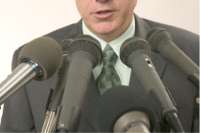
What would you do if the local news team or ombudsman phoned or appeared in your office? It could happen to you. Unexpected calls and visits from reporters and watchdogs are made to even the best companies, for unforeseen reasons.
Here is advice from Herb Schmertz on handling the media under adverse circumstances, from his book, Good-bye to the Low Profile. For 20 years Mr. Schmertz was a member of the board of directors and vice president of public affairs for Mobil Oil.
»» Don't let a reporter intimidate you into talking by telling you it's in your best interest to cooperate. He could be right, but the decision should be yours, not his or hers.
»» Feel free to ask the reporter whom else he will interview and what his sources are.
»» Don't allow a reporter to seduce you through flattery or by coming across as a trustworthy friend. In many cases, by engendering a warm, friendly feeling, his aim is to encourage you to say things you shouldn't.
»» Some reporters may use techniques or intimidation such as trying to convince you they are morally superior or represent the public more than you. Your objective is to put yourself on equal footing with the journalist. Remember, you are the expert.
»» Try to avoid saying "no comment."
Don't wait for an emergency to initiate contact with the media. Start now--when there's no story to report.
Treat reporters as you would want to be treated. Don't try to make friends with them, but do try to establish a real relationship so that they can respond to you as an individual instead of as the representative of a firm.
GOOD-BYE TO THE LOW PROFILE. 1986. Little, Brown & Company. Boston.